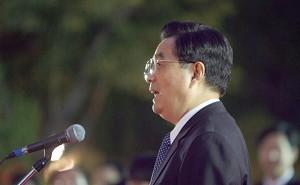Reuters reported that in Beijing, the Chinese Communist Party (CCP)’s General Secretary Hu Jintao was urged by people within the party to cede his presidency to Vice Chairman Zeng Qinghong, who was identified as a member of the Shanghai Gang, in order for Hu to better consolidate his position within the party.
Only phantoms would believe that Hu would cede his presidency in order to consolidate his position within the party. In 1959, Mao was forced to cede the presidency after the failure of the “Three Red Flags Movement” promoted by him. He then only held the top position within the CCP, the General Secretary of the CCP, which was said to provide him the opportunity to be more focused on studying Marx and Lenin’s theories. He later initiated the bloody Cultural Revolution to recapture his power. At the end of the 60’s, when Mao’s successor Lin Biao was about to become the country’s president, Mao ruthlessly forced Lin out and Lin died in the Mongolian deserts. Therefore, there were no presidents during the ten years of the Cultural Revolution. It was not until 1982 that the constitution was amended and the position of the president was re-defined. The position could not be held by the top person of the Political Politburo of the Central Committee of the CCP in order to avoid power struggle within the party.
Since the 1990s, Jiang Zemin was the General Secretary of the CCP, the Chinese President and the Chairman of Central Military Commission, the top position in the military. Currently Hu Jintao also holds these three positions. If Zeng Qinghong became the president, he might promote a so-called reformation to “Have the Military Serve the Country, not the Party,” aiming Hu to cede his top military position as well.
Through this power struggle for the presidency, one can see some clues of the power struggle within the CCP. Last June, Hu Jintao gained cooperation from Zeng Qinghong to be able to bring down the Shanghai Gang. The Secretary of Shanghai City CCP Committee, Chen Liangyu, lost power as a result of alleged corruption. However, the case could not be further investigated as it involved the most corrupted officials in the Political Bureau, Huang Ju and Jia Qinglin. Further investigation would shake the foundation of the CCP and the nation. Hu Jintao and Wen Jiaobao dared not to do so because their own families are also corrupt. Since Zeng Qinghong has helped Hu in forcing Chen Liangyu out, how would Hu return the favor? The fact is that Zeng wants the presidency.
In order to secure his position, Hu Jintao first let his intelligence aid, Vice Chief of CCP’s Central Translation Bureau publish an article titled “Democracy is a Good Thing” to gain support from the public. This article has initiated heated discussions within the nation. The famous Finance and Economics Journal in its first issue of 2007 reported in detail the corruption in the Luneng Group. The Luneng Group is the largest business in Shandong Province and is also the largest business held by employees in the nation’s power system. The article said that state asset of over 70 billion yuan (US $9 million) might have been lost after one year of “transformation.” One key person involved is Zeng Wei, son of Zeng Qinghong. The other two are members of the CCP Political Bureau: one is Yu Zhengsheng, Secretary of Hubei Provincial CCP Committee; the other is Wang Lequan, Secretary of Xinjiang Provincial CCP Committee. The Chief Editor of Finance and Economics Journal Hu Shuli, who was regarded as the “Conscience of China” for her disclosures of corruptions and other journals could also be involved in this power struggle.
The power struggle within the military is even more shocking. The anti-corruption movement at top levels as well as human affair changes has disturbed the military. Five military aircraft accidents occurred in the past year, and there are already two this year. The military force managed by Jiang for over a decade will become an important battlefield for future power struggles.
